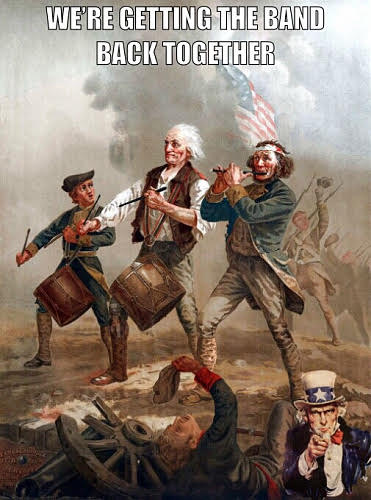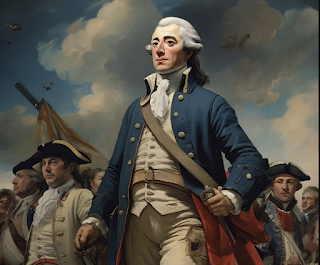
Reclaiming the Romance of Our Cause
By Daniel Greenfield – December 21, 2023
“Put my musket in my hand and belt my sword around me,” a returning French soldier pleads with his comrade in ‘Two Grenadiers’. He envisions his body being buried to wait for the return of Napoleon from captivity. “Then will my Emperor ride over my grave, swords will be clashing and flashing; and armed, I’ll rise up from the grave, to guard my Emperor.”
In Schumann and Wagner’s musical renditions of Heinrich Heine’s poem, the dark tones give way to the ringing triumphant peals of the Marseillaise, the French national anthem, as the faith of the resurrected soldier is rewarded with a messianic return of Napoleon and his armies.
Napoleon’s promise to carry on the work of the French Revolution and “liberate” the world had inspired a cult of personality. Beethoven had initially dedicated his Eroica symphony to Napoleon. And the famous composer was far from alone in being caught up in his cause.
The German liberal admirers of Napoleon eventually split into nationalists and radicals. Their cultural descendants became Communists or Nazis. Millions were carried away by cults of personality that made mass murder seem exciting and glamorous. Ernst Hanfstaengl, a member of America’s elites, made “Sieg Heil” resonate to Harvard football chants of “Fight, fight, fight!”
Until too many bodies began to pile up, American elites were enthused by the energy of Communism and National Socialism. Writers, musicians, pundits and politicians admired Mussolini, Lenin, Hitler and Stalin as latter day Napoleon who could get things done. Revolutions to topple the order and remake the world would always be more romantic.
And that has never changed.
Israelis, like Americans, have fallen into the folly of arguing the morality of their cause, but the romance of a cause always trumps its morality. America’s cause and Israel’s cause were far more popular when they were romantic rather than when they insisted on their morality.
Morality inspires few people. When you have to argue the morality of your cause, you’ve lost.

Why do so many side with Islamic terrorists over America or Hamas terrorists over Israel? Much like the Nazis or the Communists, Jihadists have made for a more romantic cause. Some of the same Americans who might have gone Nazi in the 1930s instead convert to Islam and try to carry out terrorist attacks in America. Some head to Turkey to travel and meet up with ISIS.
What attracts them? Some of the same things that drew their forebears to the French Revolution, to Napoleon, to succeeding radical 19th century movements, to Nazism and Communism, to Marxist guerrillas and then Islamic terrorists who offer a romantic cause.
What draws so many men and women is not morality, but excitement. Passion, glory, and a willingness to die for a cause can just as easily be turned to evil as to good. Many people however simply do not care. The revolutionary energy of bringing things down will always appeal more, especially to young and resentful people, than defending home and hearth.
Pitting moral and rational arguments against the romance of the cause is futile.
Why complain that the shooting of one drug dealer by a police officer can lead mobs to burn cities, but when drug dealers shoot each other over the weekend, nothing happens? Only one of these allows its followers to march, shout slogans, clash with police and smash things. Only one offers a narrative of injustice and courageous people pitted against an oppressive system.
The heroic narrative is more compelling than the facts. People rally to causes that feel good, not necessarily to those that are right. And when the cause feels good, they rationalize it.
The great genius of the Left has been to position its cause as the perpetual revolution, an endless battle against oppression, and a messianic redemptive battle for the soul of the world. The Left distracts from the fact that it is in power by finding new enemies to fight: police officers, oil companies, misgenderers, or the Jews. A new cause is born and the revolution rolls on.
America and Israel were once revolutionary causes, but as we have found ourselves on the defensive, we have also lost touch with the romance of our causes. Romantic causes are offensive. Defenses, unless they’re last stands for a lost cause, are not romantic. Following Patton’s advice, leftists never defend, they always attack. And conservatives, all too often, defend rather than attack, react rather than act and force the enemy to react to them.
The Left buries its opponents with invective, accusations and smears. It puts them on the defensive. And then rather than articulating a cause, they try to justify their existence.
The first rule of debate is that defending something partially concedes it. A good debater forces the other side to debate its existence. A deeply misguided debater keeps trying to justify his existence and in doing so introduces ever more doubt into whether he deserves to exist.
When Jews argue that Israel has a right to exist, they are really opening up the question to debate. Meanwhile no one is debating whether the ‘Palestinian’ terror statelets have a right to exist. Theirs is a glorious and romantic cause because, in part, they never put it up for debate.
During the Holocaust, Jews tried to argue that they had a right to exist. That argument was mostly lost and few except a handful of humanitarians even felt the need to take it up. A few years later, Jews launched an independent country and defeated the invading Arab armies.
Israel was hated by many, but it was also admired and celebrated as a romantic cause. The country carved out of the desert, built by rugged pioneers, and watched over by shepherds with rifles over their shoulders, was glorious and inspiring in a way that no one could ignore.

American Jews however chose to emphasize the Holocaust: portraying Jews as helpless and in need of saving. Stories of Jews, especially Zionists, resisting and fighting back were deemphasized. After generations of using the Holocaust to teach tolerance, they are surprised that it hasn’t worked and that the existence of Jews is once again up for debate.
Israel once used to play up the risky and revolutionary nature of a country, alone and at odds with much of the region, but its narratives have become defensive. And the more Israel explains that it isn’t an “apartheid state” or genocidal, the more it promotes these same slurs. Defending its own morality is, like most defensive positions, ultimately futile and a losing proposition. The more you defend yourself against an accusation, the more it becomes associated with you.
And the more people decide that there must be some truth to it.
America has made some of these same mistakes. Like Israel, the very things we have been taught to be ashamed of, building a country out of nothing and defending it against all comers, is a large part of the romance of our cause. Leftist smear campaigns have made our strengths seem like weaknesses and have taught us to think of our weaknesses, extending our rules to the enemies that want to destroy us, as our strength. The more we explain how fair we are, the more we open up our fairness for debate and indict ourselves as an oppressive country.
The romance of our causes is there in our histories, all we have to do is reach for it. They are there in the stories and legends that we have dismissed as outmoded and reactionary, discredited by “historians” and derided as parts of our past that we ought to turn away from.
Those are the sources of our strength and point the way to a revival of our nations.
How many American youth really want to stand with evil, and how many are drawn to it because they see no cause of their own country that stirs their blood and makes their hearts beat faster? When their own nation no longer inspires, they will find inspiration among its enemies.
There are American and Israeli soldiers and civilians fighting and dying against Islamic terrorists, police officers slain by BLM domestic terrorists, and yet we hardly know their names or tell their stories. When BLM shouts, “say their names”, they are building legends. We have legends among us. We have causes that changed the world. Yet we fail to express them.
The romance of a cause lies in its passion to change the way things are. When we fail to tap into that passion to change the oppressive way things are at any cost, we lose.
“The best lack all conviction, while the worst are full of passionate intensity,” Yeats wrote. It doesn’t have to be this way. It is not enough to argue that our cause is moral. We must find the passion to lay it out as not only a defense against the worst, but the triumph of the best.
Unless our causes feel glorious, our enemies will make them appear inglorious.
Daniel Greenfield is a Shillman Journalism Fellow at the David Horowitz Freedom Center. This article previously appeared at the Center’s Front Page Magazine.

The dem left have turned the people into victims.